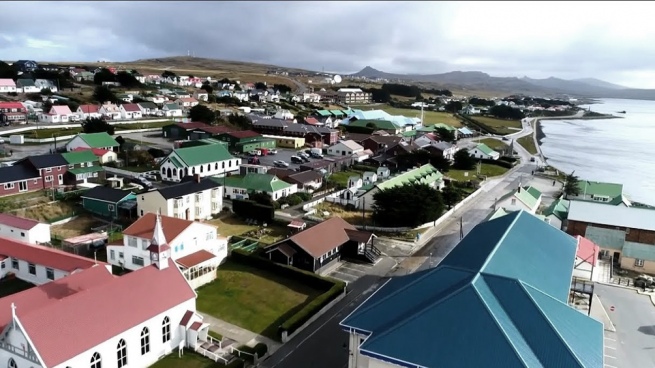The Falkland Islands have an economy that generates exports of US$298 million a year, with fishing as its main resource, followed by the production of wool, sheep meat and tourism, according to official data from Argentina.
In addition, the southern archipelago usurped by the United Kingdom has a high potential for hydrocarbons, with a maritime deposit that could produce a peak of 80,000 barrels of oil per day,
The GDP of Malvinas in 2018 was 254.7 million pounds sterling, equivalent to the exchange rate of that year at US$ 331.11 million, which represented 0.06% of the GDP of Argentina, which was US$ 517.6 billion.
Its main resource, fishing, represents around 58.5% of the GDP of the islands, that is, US$193.69 million, according to the figures handled by the Secretariat of Malvinas, Antarctica and the South Atlantic, dependent on the Foreign Ministry. .
For its part, the latest report on the state of the economy, corresponding to 2020, from the Directorate of Policy and Economic Development of the illegitimate government of the islands, specifies that Malvinas foreign trade was 111% of GDP on average between 2016 and 2018.
In the last decade, the goods exported by the Falklands grew steadily on average by 8% year-on-year.
On average between 2016 and 2019, the European Union was the destination of 83% of the Falklands’ exports of fishery products, as well as a third of its meat products.
The main exports of the islands are fish products, wool and meat.
Fishery products are the largest exported good, representing on average 91% of all exports between 2010 and 2019, or about US$271 million annually.
For its part, wool continues to be the most important agricultural product of the Malvinas, and in the last ten years, the value of exports increased 73%, reaching US$ 15.6 million in 2019, with a growth of 32, 3% year-on-year.
This performance makes wool the second largest good exported from the islands after fishery products.
Large-scale exports of mutton and sheep meat also started in 2003 and in the last ten years, the value increased by 84%, mainly driven by an increase in the quantities sold abroad.
Lamb and sheep exports were worth US$2.4 million in 2019 and US$3.4 million in 2018.

As for the main economic resource, fishing in the waters of the Malvinas is controlled by a system of individual transferable quotas, and is carried out by resident companies on the islands that act alone or jointly with foreign partners, mainly Spanish.
“The illegitimate government in the Malvinas Islands sells an average of 230 licenses per year to exploit species such as the Illex Squid, the Loligo and the Black Hake,” the Foreign Ministry specified.
In 2020, due to lower catch levels due to the outbreak of the coronavirus pandemic, export volumes decreased by 30%, from 87,000 to 61,000 tons.
However, this drop in export volumes was almost entirely offset by a 31% increase in international prices, and thus revenues from foreign sales totaled US$234,362, which represented a 7% year-on-year decrease.
Likewise, in recent years, the fishing industry has driven the growth of other sectors of the economy, such as transport and storage, and administrative and support services, as well as investments made in subsidiary companies in sectors that include trade. retail and real estate.
Revenue from fishing license fees was US$30.57 million in the 2018/19 season.
During 2018 and 2019, the meetings of the scientific subcommittee, created by the South Atlantic Fisheries Commission (CPAS), established under a sovereignty formula through the Joint Declaration on the Conservation of Fishery Resources of November 1990, were resumed.

In 2020, the Argentine government proposed to its counterpart in the United Kingdom that in order to continue with the cooperation scheme on the matter, it was necessary to respect all the terms of the 1990 Joint Declaration on the Conservation of Fishery Resources, addressing all the contents expressed therein. .
“In this sense, it was necessary to coordinate joint conservation measures, especially with respect to closed areas in the disputed area, and also for the United Kingdom to cease unilateral fishing licenses,” the Foreign Ministry explained.
Another of the economic income of the Malvinas is produced from the fact that the islands receive visits from cruise ship passengers and international tourists.
The number of cruise passenger arrivals grew from around 20,000 in the early 2000s to almost 73,000 in the 2019/20 season, reaching the highest number ever seen in a single season.
These cruise visitors are estimated to have spent a total of US$5.76 million, and passenger tax revenue was US$1.93 million in 2019/2020.
In this season, 80,947 people entered the Malvinas as tourists who spent US$20.3 million.
As for the hydrocarbon sector, “in the framework of illegal exploration campaigns, in 2010 the Sea Lion deposit was discovered in the North Basin, the first with the potential to be commercially viable,” the Foreign Ministry said.
He specified that “in 2019 the first offshore tender carried out by Argentina in the Malvinas Basin, to the southwest of the islands, concluded,” and added that “in May 2020 the suspension of the project to exploit the Sea Lion field is announced until further notice.” .

The archipelago has a maritime deposit with a potential that reaches almost half of Vaca Muerta
The Malvinas Islands have an offshore field discovered in 2010, Sea Lion, with a peak production potential of 80,000 barrels of oil per daywhich represents almost half of the 200,000 produced by the Vaca Muerta deposit in Neuquén.
In 1995, Argentina and the United Kingdom signed the Joint Declaration of Cooperation on offshore activities in the Southwest Atlantic.
“From 1996 to 2008, the illegitimate island government unilaterally granted a total of 34 operating licenses: 7 in 1996, 10 in 2001, 14 in 2004, 2 in 2005 and 1 in 2008″, specified the Secretariat of Malvinas, Antarctica and the South Atlantic, of the Argentine Foreign Ministry.
In addition, that body indicated that “from 1998 to 2016 the illegitimate island government authorized four exploration campaigns (1998, 2010-2013, 2015-2016), concentrated mainly in the North Basin”.
“Before the succession of unilateral acts Argentina decided in 2007 to denounce the Joint Declaration signed in 1995″, highlighted the Secretariat, which pointed out that “in the framework of illegal exploration campaigns, in 2010 the Sea Lion deposit was discovered in the North Basin, the first with potential to be commercially viable“.
In 2019, the first offshore tender carried out by Argentina in the Malvinas Basin, to the southwest of the islands, concluded and in May 2020 the suspension of the Sea Lion field exploitation project was announced until further notice.
Discovered in 2010, it is the first with the potential to be commercially viable around the Falkland Islands.
The deposit is located in the extreme north of the North Basin, 220 kilometers from the islands and 2.5 below the seabed.
“The illegal exploitation licenses granted on the deposit, whose term was scheduled for May 2021, were extended to November 2022,” the Secretariat indicated.
He specified that “the companies that own these illegal licenses are the British Premier Oil (acquired by Chrysaor in late 2020) and Rockhopper Exploration.” He noted that “Israel’s Navitas Petroleum signed an association agreement that has not yet been approved by the illegitimate island government”.
Premier Oil calculated that in the first phase of exploitation it would produce 250 million barrels of oil over 20 years, with a peak production of 80,000 barrels per day.
Law 26,659 of 2011, amended by Law 26,915 of 2013, establishes administrative and criminal sanctions for exploration or extraction of hydrocarbons in the bed or subsoil of the Argentine territorial sea or continental shelf, without authorization from Argentina.
The prohibitions and sanctions reach companies or individuals that carry out these activities, that participate in companies that carry them out or that provide services in support of them.
The application of administrative sanctions is the responsibility of the Secretary of Energy, as the enforcement authority of the aforementioned law, and the instruction and judgment of criminal sanctions corresponds to the federal justice.
The prohibitions established in the regulations are central in the protection of non-renewable national resources that are found on the Argentine continental shelf and that could be the object of illegal exploitation.
In this framework, since 2015 they began Judicial actions against companies that carried out prohibited activities and discouragement and awareness notes were sent to others that could be linked.
In 2021, new actions were promoted at the administrative headquarters aimed at sanction the British company Harbor Energy and the Israeli company Navitas Petroleum for commercial activities linked to hydrocarbon exploration on the Argentine continental shelf.

















